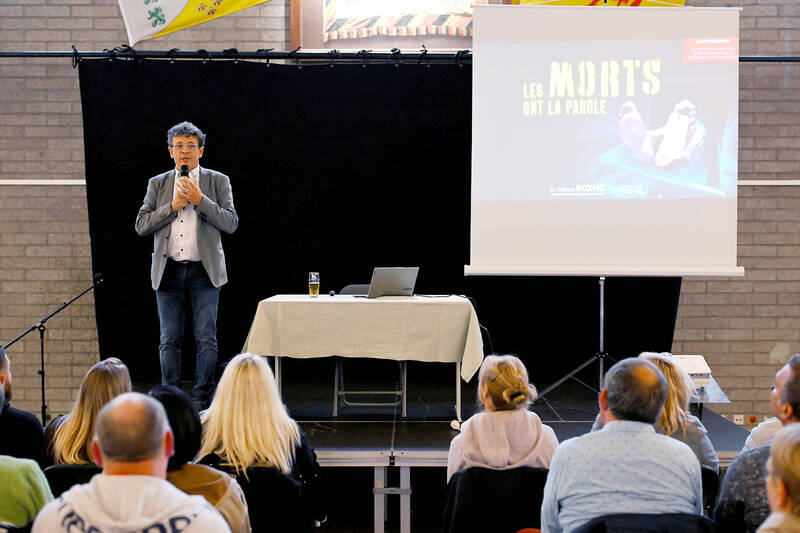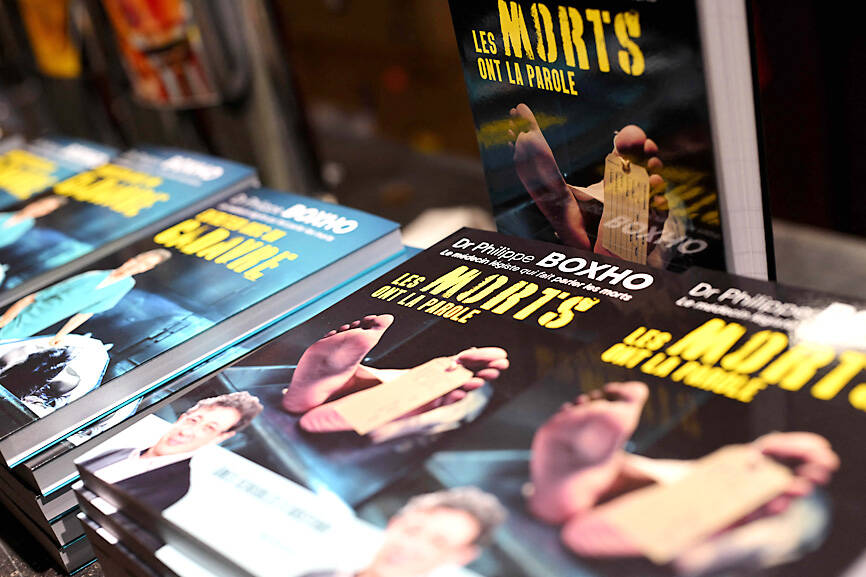Forensic pathologist Philippe Boxho likes to ask people “why shouldn’t we laugh about death?” But gallows humor is just one of the ingredients that the surprise literary sensation brings to his macabre line of storytelling.
In 33 years as a medical examiner in Belgium’s eastern Liege region, Boxho has performed hundreds of autopsies — his attention to detail bringing to light homicide cases that would otherwise have remained undetected.
Boxho has become a surprise star of the book world in Belgium and France, distilling his unusual line of work into taut collections of short stories, each one 15 pages or less.

Photo: AFP
Anchored in real life, the writing is unflinching and darkly-humorous, but the 59-year-old Boxho also seeks to impart some of his passion for a little-known, but crucial, profession.
The enthusiasm is palpable as the pathologist described the “excitement of being there at the start of an investigation,” of pulling on his sturdy dishwashing gloves and white coveralls to begin working.
It’s a way, he said of his work, “to give voice to the dead one last time.”

Photo: AFP
Boxho’s observations have revealed the most unusual of circumstances for a person’s demise — like the 60-something woman who had her throat slashed by her son’s pitbull terrier, that she had exceptionally gone to feed.
Another time he established how a farmer was trapped by a bull he did not see surge from the stable shadows. Multiple fractures to the torso and limbs showed how the hapless victim was crushed by a beast weighing in at 1.2 tonnes.
The idea of writing came to Boxho in 2021, triggered by the success of a post by Belgian channel RTBF, in which he recounted three striking anecdotes.
Encouraged, he decided to set down in writing more of the stories pulled from his more than three decades in forensics — which until then had been shared only with students at the medical school where he teaches.
It was an instant hit: published almost back-to-back, his three books have together sold some 740,000 copies, including almost 200,000 for the latest one released in late August, whose title translates as “Looking death in the face.”
“It’s extraordinary for a work of non-fiction,” said a spokesperson for Kennes, a small Belgian publisher that was struggling to make ends meet until it struck gold with Boxho.
In France, his latest book is among the season’s non-fiction bestsellers, with talks underway on an English edition of his work.
’I RESPECT THE BODY’
At a book-signing event at a former mining site in Blegny, near Liege, Boxho drew a full house of enthusiasts.
“It’s fascinating to hear him talk because he’s passionate about what he does,” said Marie Lou Collard, a political science student who was among the readers in the audience.
She came across Boxho via his videos posted on TikTok and YouTube, and sought out his essays to find out more.
In all of Boxho’s real-life stories, dating back sometimes decades, the identities have been changed in keeping with medical confidentiality rules.
“I respect the body I have in front of me,” Boxho said. “It belongs to a person I don’t know.”
“What I laugh about is death and the ways that people die,” he said. “It’s a bit cynical, but that’s the way I am. If you don’t like it, don’t read my books.”
Many of his cases have involved women killed by their partners. Sometimes it is a parent killed by a child — or almost killed, as in one extraordinary case Boxho shared with the crowd in Blegny.
Late one night, a woman entered her father’s bedroom with a revolver, intent on murdering him. She fired the entire barrel at him, and left him for dead.
But the autopsy later showed the suspected murder victim was already dead when she shot him — of a brain hemorrhage that occurred just moments earlier — and the daughter was cleared as a result.
“Criminal law requires certainties,” said Boxho, who argued that defending his profession, whose numbers have dwindled dramatically in recent years in Belgium, is also a way of ensuring better justice for all.

April 28 to May 4 During the Japanese colonial era, a city’s “first” high school typically served Japanese students, while Taiwanese attended the “second” high school. Only in Taichung was this reversed. That’s because when Taichung First High School opened its doors on May 1, 1915 to serve Taiwanese students who were previously barred from secondary education, it was the only high school in town. Former principal Hideo Azukisawa threatened to quit when the government in 1922 attempted to transfer the “first” designation to a new local high school for Japanese students, leading to this unusual situation. Prior to the Taichung First

When the South Vietnamese capital of Saigon fell to the North Vietnamese forces 50 years ago this week, it prompted a mass exodus of some 2 million people — hundreds of thousands fleeing perilously on small boats across open water to escape the communist regime. Many ultimately settled in Southern California’s Orange County in an area now known as “Little Saigon,” not far from Marine Corps Base Camp Pendleton, where the first refugees were airlifted upon reaching the US. The diaspora now also has significant populations in Virginia, Texas and Washington state, as well as in countries including France and Australia.

On April 17, Chinese Nationalist Party (KMT) Chairman Eric Chu (朱立倫) launched a bold campaign to revive and revitalize the KMT base by calling for an impromptu rally at the Taipei prosecutor’s offices to protest recent arrests of KMT recall campaigners over allegations of forgery and fraud involving signatures of dead voters. The protest had no time to apply for permits and was illegal, but that played into the sense of opposition grievance at alleged weaponization of the judiciary by the Democratic Progressive Party (DPP) to “annihilate” the opposition parties. Blamed for faltering recall campaigns and faced with a KMT chair

Article 2 of the Additional Articles of the Constitution of the Republic of China (中華民國憲法增修條文) stipulates that upon a vote of no confidence in the premier, the president can dissolve the legislature within 10 days. If the legislature is dissolved, a new legislative election must be held within 60 days, and the legislators’ terms will then be reckoned from that election. Two weeks ago Taipei Mayor Chiang Wan-an (蔣萬安) of the Chinese Nationalist Party (KMT) proposed that the legislature hold a vote of no confidence in the premier and dare the president to dissolve the legislature. The legislature is currently controlled